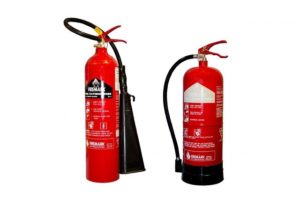Every home should have fire extinguishers. Ideally, they should have multiple. It’s one of the single most important things you can do to reduce the risk of a house fire dramatically. In spite of this, as many as 25% of homeowners don’t even have one—and even more have fire extinguishers that have expired. Today, we’ll give you the low-down on fire extinguisher expiration dates.

Where can you find the expiration date on your fire extinguisher? And how should you dispose of expired ones? Take a look!
Where Can I Find the Expiration Date?
The location of expiration dates on fire extinguishers isn’t universal. But it does tend to show up in one of the following spots:
- On the body of the cylinder
- Underneath the plastic ring near the neck
- The label
In essence, it can be anywhere on your fire extinguisher. Just look it up and down until you come upon a date.
You may find a manufacturing date instead of a date of expiration. If this is all you can find, assume that the expiration date is roughly 10 years after.
What Does the Expiration Date Mean?
Many people are surprised to learn that fire extinguishers have expiration dates. This can be a major cause for concern when homeowners have a false sense of security with a 20-year-old fire extinguisher in their possession.
Simply put, you should never use an expired fire extinguisher to try to put out a fire. While it’s not as though a fire extinguisher will be in working order one day and completely unusable the next, it will gradually become less effective as the years go on. Some fire extinguishers may last longer than 10 years, but that is a good rule of thumb as to when you should replace them.
It is not dangerous to use an expired fire extinguisher, but it will not effectively put out a fire. This is because its pressure declines over time. If they are all you have on hand in the event of a fire, go ahead and give it a try. But, for the sake of fire safety, always replace them when it’s getting to be that time.
What Should I Do with an Expired Fire Extinguisher?
If your fire extinguisher has expired, you must dispose of it correctly. Your first course of action is to call your nearby fire department, as there is a good chance they will accept expired extinguishers. If not, bring it to your local dump and make sure to place it with the hazardous waste.
If you know for sure that your extinguisher is empty, however, you may be able to recycle it. Bring it to your closest recycling facility and ask if they can accept an empty steel fire extinguisher shell.
Commercial and Residential Fire Prevention from Judd Fire Protection
If you want to ensure your home and business are safe throughout the year, trust Judd Fire Protection, LLC. We have over two decades of experience in designing, installing, inspecting, and repairing residential and commercial fire protection systems. We serve clients throughout Maryland, Pennsylvania, Washington, D.C., Virginia, and West Virginia. If you are interested in finding out more about our services and protecting your home and business, give us a call at 410-871-3480 or contact us online. For more fire safety tips, follow us on Facebook, Twitter, and Pinterest.
